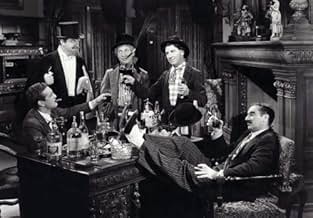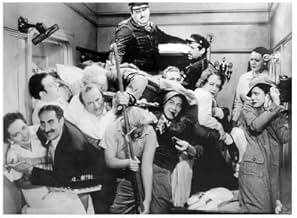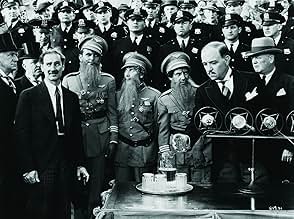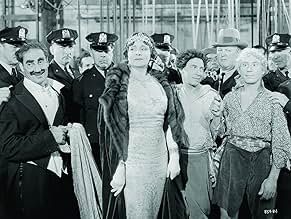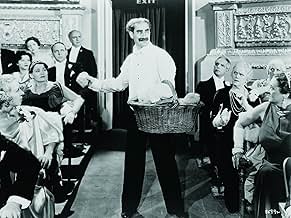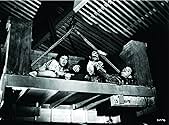A sly business manager and the wacky friends of two opera singers in Italy help them achieve success in America while humiliating their stuffy and snobbish enemies.A sly business manager and the wacky friends of two opera singers in Italy help them achieve success in America while humiliating their stuffy and snobbish enemies.A sly business manager and the wacky friends of two opera singers in Italy help them achieve success in America while humiliating their stuffy and snobbish enemies.
- Awards
- 3 wins total
Walter Woolf King
- Rudolfo Lassparri
- (as Walter King)
Sig Ruman
- Herman Gottlieb
- (as Siegfried Rumann)
Robert Emmett O'Connor
- Police Sergeant Henderson
- (as Robert Emmet O'Connor)
Enrique Acosta
- Nightclub Guest
- (uncredited)
Harry Adams
- Opera Spectator
- (uncredited)
Harry Allen
- Doorman
- (uncredited)
Sam Appel
- Dungeon Guard
- (uncredited)
King Baggot
- Dignitary
- (uncredited)
Marion Bell
- Lady looking for 'Aunt Minnie'
- (uncredited)
Edna Bennett
- Maid
- (uncredited)
Summary
Reviewers say 'A Night at the Opera' is celebrated for its iconic comedic routines and the Marx Brothers' unique blend of verbal and physical comedy. Groucho's wit, Chico's musical talents, and Harpo's slapstick humor are highlighted. Margaret Dumont's role and musical numbers add entertainment value, though some criticize their integration. The film is praised for its production quality and subversion of high society norms. However, a perceived shift towards more structured comedy marks the beginning of a decline in their later works.
Featured reviews
Groucho Marx is in his element as slick, fast talking business manager Otis B. Driftwood, who spends his time playing up to arts patron Mrs. Claypool (classic Marx Bros. foil Margaret Dumont). When he sees that she's willing to pony up $1,000 a night to have pompous Lassparri (Walter Woolf King) sing, he wants a piece of the action. Circumstance soon throws him together with equally sly Fiorello (Chico) and goofy Tomasso (Harpo), as they become determined to help out young lovers & aspiring opera stars Rosa (Kitty Carlisle) and Ricardo (Allan Jones).
Even if one is not a fan of the opera, they shouldn't let that dissuade them from checking out the Marx Bros. in their glory. Some buffs consider this their best film, and it certainly shows off their talents to memorable effect. Musical interludes do go on a bit long, but the quality of the comedy when it occurs is top notch. There are some truly great bits in here, like the "party of the first part" contract, the overcrowded (to say the least) stateroom sequence, and the frantic, farcical efforts of Otis, Fiorello, Tomasso, and Ricardo to pull the wool over the eyes of a suspicious inspector (Robert Emmett O'Connor) by moving beds from one room to another.
Groucho is hilarious, as always. Very few entertainers in film history can fire off a one-liner as snappily as he does. Chico and Harpo have their wonderful moments, as well. (It's such a hoot when Harpo does a Spider-Man routine near the end.) Carlisle and Jones are extremely appealing, Dumont is once again a fine "straight woman", King is an appropriately snooty villain, Sig Ruman is superb as eternally frustrated Gottlieb, and O'Connor is likewise good as the antics of Otis and company take a toll on him.
The pace isn't always consistent, but there is some enjoyable action and first rate stunt work. Overall, this is a solid comedy / musical that will appeal to any lover of this era in cinema.
Eight out of 10.
Even if one is not a fan of the opera, they shouldn't let that dissuade them from checking out the Marx Bros. in their glory. Some buffs consider this their best film, and it certainly shows off their talents to memorable effect. Musical interludes do go on a bit long, but the quality of the comedy when it occurs is top notch. There are some truly great bits in here, like the "party of the first part" contract, the overcrowded (to say the least) stateroom sequence, and the frantic, farcical efforts of Otis, Fiorello, Tomasso, and Ricardo to pull the wool over the eyes of a suspicious inspector (Robert Emmett O'Connor) by moving beds from one room to another.
Groucho is hilarious, as always. Very few entertainers in film history can fire off a one-liner as snappily as he does. Chico and Harpo have their wonderful moments, as well. (It's such a hoot when Harpo does a Spider-Man routine near the end.) Carlisle and Jones are extremely appealing, Dumont is once again a fine "straight woman", King is an appropriately snooty villain, Sig Ruman is superb as eternally frustrated Gottlieb, and O'Connor is likewise good as the antics of Otis and company take a toll on him.
The pace isn't always consistent, but there is some enjoyable action and first rate stunt work. Overall, this is a solid comedy / musical that will appeal to any lover of this era in cinema.
Eight out of 10.
I didn't fully appreciate this film until my second viewing. Now I think it's one of the better Marx Brothers film. The film - filled with funny lines - has all the familiar MB trappings: good slapstick, good and bad jokes and routines, wild scenes, several musical numbers and general overall chaos.
The only thing not appealing to me in the film were some of the songs - not all, just some. Otherwise, it was all fun as Groucho, Chico and Harpo all share humorous lines and/or sight gags. Kitty Carlisle doesn't offer much in the way of a young beauty but it was still interesting to see her at this age as I had only known her through her "To Tell The Truth" television days. Alan Jones, meanwhile, is a pleasing singer and a nice guy, as always.
This is the film with the famous scene involving a ton of people being stuffed into Groucho's small cabin room. It's more amazing than funny. My favorite scenes were when Groucho and Chico got into discussions and trade lines back-and- forth. I also laughed heartily at the finale with Harpo swinging like Tarzan at the opera house.
In all, a funny MB film, one of the boys' better efforts. I play it with the English subtitles so as not to miss any of the great lines of dialog in here.
The only thing not appealing to me in the film were some of the songs - not all, just some. Otherwise, it was all fun as Groucho, Chico and Harpo all share humorous lines and/or sight gags. Kitty Carlisle doesn't offer much in the way of a young beauty but it was still interesting to see her at this age as I had only known her through her "To Tell The Truth" television days. Alan Jones, meanwhile, is a pleasing singer and a nice guy, as always.
This is the film with the famous scene involving a ton of people being stuffed into Groucho's small cabin room. It's more amazing than funny. My favorite scenes were when Groucho and Chico got into discussions and trade lines back-and- forth. I also laughed heartily at the finale with Harpo swinging like Tarzan at the opera house.
In all, a funny MB film, one of the boys' better efforts. I play it with the English subtitles so as not to miss any of the great lines of dialog in here.
This is probably the best Marx Brothers film. It is certainly my favorite. The brothers destroy pomposity and pretension by the ton. The pieces of comic business were worked out through many live theater performances before the scenes were finally filmed. This craftsmanship never shows, but it pays off completely. The stateroom scene is a classic, and the total devastation of the opera is a delicious piece of craziness.
"A Night at the Opera" is one of those films you can see dozens of times and laugh just as hard as you did the first time. The brothers get mixed up with an opera company and a divo and diva in love - Allan Jones and Kitty Carlisle, and trying to get the two to perform together.
The one-liners come so fast - you keep thinking you'll remember them, but one is funnier than the next. I do remember what Groucho says when he sees the gypsy Azucena in the opera, however. "How would you like to feel how she looks?" The stateroom scene is, of course, a classic, and my favorite part is when Groucho tells the housekeeper, "I want two pillows on that bed" and Harpo sound asleep and being moved everywhere, including onto a tray of food.
But nothing beats the last half hour - the performance of "Il Trovatore" with Harpo using the stage ropes like Tarzan, and Chico playing baseball in the orchestra while Groucho sells peanuts. They have replaced part of the overture with "Take Me Out to the Ball Game."
Allan Jones plays the tenor Ricardo Baroni who is hoping for his break. Why they cast the blond Jones as a tenor named Baroni - well, there you go. He sings very well and is quite handsome. Kitty Carlisle is the diva waiting, petite and pretty and singing music out of her vocal type, with the exception of "Alone." "Stridono lassu" and Leonora in Trovatore were both much too heavy for her. She does sing well and what a woman - she's still alive and recently performed at a New York supper club recently at the age of 95.
The only problem with any Marx Brothers film is that when they aren't in front of the camera, suddenly their films become very slow. Because I was trained in opera and have some interest in it, this was less the case than with some of their other films. They were too magical, too energetic, and too darn funny to ever share a spotlight with anyone else. Thank goodness they did, though, as they left us with many treasures. This is one.
The one-liners come so fast - you keep thinking you'll remember them, but one is funnier than the next. I do remember what Groucho says when he sees the gypsy Azucena in the opera, however. "How would you like to feel how she looks?" The stateroom scene is, of course, a classic, and my favorite part is when Groucho tells the housekeeper, "I want two pillows on that bed" and Harpo sound asleep and being moved everywhere, including onto a tray of food.
But nothing beats the last half hour - the performance of "Il Trovatore" with Harpo using the stage ropes like Tarzan, and Chico playing baseball in the orchestra while Groucho sells peanuts. They have replaced part of the overture with "Take Me Out to the Ball Game."
Allan Jones plays the tenor Ricardo Baroni who is hoping for his break. Why they cast the blond Jones as a tenor named Baroni - well, there you go. He sings very well and is quite handsome. Kitty Carlisle is the diva waiting, petite and pretty and singing music out of her vocal type, with the exception of "Alone." "Stridono lassu" and Leonora in Trovatore were both much too heavy for her. She does sing well and what a woman - she's still alive and recently performed at a New York supper club recently at the age of 95.
The only problem with any Marx Brothers film is that when they aren't in front of the camera, suddenly their films become very slow. Because I was trained in opera and have some interest in it, this was less the case than with some of their other films. They were too magical, too energetic, and too darn funny to ever share a spotlight with anyone else. Thank goodness they did, though, as they left us with many treasures. This is one.
A Night At the Opera is the first film that three Marx Brothers did at MGM after leaving Paramount. Zeppo, who's contributions to the team are pretty negligible, decided not to make the trip.
Nothing was lost and a lot was gained because Allan Jones assumed a Zeppo like character with a lot more personality and a great singing voice. With the story set at an opera company you would hope that a great voice would be a minimal requirement. In fact we have a bunch of great voices, not only Allan Jones, but Kitty Carlisle, and even egotistical tenor Walter Woolf King.
The plot such as it is concerns the three brothers trying to get talented singer Allan Jones a break at the opera company. They're operating on many fronts here and that includes Groucho wooing the New York Opera Company's grande dame, Margaret Dumont. Harpo and Chico in the meantime become the bane of the existence for opera director Sig Ruman and Walter Woolf King.
I'm always amazed that Groucho, the king of one liners and innuendo, is constantly exasperated and occasionally defeated by Chico who baffles him with non sequiters and ignorance. Case in point their 'negotiation' over Allan Jones's contract and the fact that poor Groucho thinks he's signing star Walter Woolf King. Chico knows better than anyone there's no such thing as a sanity clause.
Allan Jones gets to sing two famous numbers identified with him, a duet with Kitty Carlisle in Alone and later a typical MGM extravaganza number in Cosi Cosa. Harpo does an Alone obbligato on the harp and Chico dazzles the crowd with his pistol fingered piano rendition of All I Do Is Dream Of You.
I'm not sure how Giuseppe Verdi would have taken the finale of A Night at the Opera in which the opening of Il Trovatore is mangled for the ages. All in the interest of seeing Allan Jones gets both a break and Kitty Carlisle. And they do make beautiful music.
And the Marx Brothers make some really funny comedy in one of their best films.
Nothing was lost and a lot was gained because Allan Jones assumed a Zeppo like character with a lot more personality and a great singing voice. With the story set at an opera company you would hope that a great voice would be a minimal requirement. In fact we have a bunch of great voices, not only Allan Jones, but Kitty Carlisle, and even egotistical tenor Walter Woolf King.
The plot such as it is concerns the three brothers trying to get talented singer Allan Jones a break at the opera company. They're operating on many fronts here and that includes Groucho wooing the New York Opera Company's grande dame, Margaret Dumont. Harpo and Chico in the meantime become the bane of the existence for opera director Sig Ruman and Walter Woolf King.
I'm always amazed that Groucho, the king of one liners and innuendo, is constantly exasperated and occasionally defeated by Chico who baffles him with non sequiters and ignorance. Case in point their 'negotiation' over Allan Jones's contract and the fact that poor Groucho thinks he's signing star Walter Woolf King. Chico knows better than anyone there's no such thing as a sanity clause.
Allan Jones gets to sing two famous numbers identified with him, a duet with Kitty Carlisle in Alone and later a typical MGM extravaganza number in Cosi Cosa. Harpo does an Alone obbligato on the harp and Chico dazzles the crowd with his pistol fingered piano rendition of All I Do Is Dream Of You.
I'm not sure how Giuseppe Verdi would have taken the finale of A Night at the Opera in which the opening of Il Trovatore is mangled for the ages. All in the interest of seeing Allan Jones gets both a break and Kitty Carlisle. And they do make beautiful music.
And the Marx Brothers make some really funny comedy in one of their best films.
Did you know
- TriviaGroucho Marx said that this was his favorite among his movies.
- GoofsRicardo is clearly standing on the dock as the ship pulls away, yet he turns up on board later as a stowaway.
- Quotes
Otis B. Driftwood: It's all right, that's in every contract. That's what they call a sanity clause.
[Fiorello laughs loudly]
Fiorello: You can't fool me! There ain't no Sanity Claus!
- Alternate versionsAll references to the first portion of the film taking place in Italy were edited from the original negative sometime after the original release. There is speculation that this was done during WWII when Italy was as Axis power, but it also may have been done in the late 1930's to appease Mussolini, who didn't like the way Italians were being portrayed. Either way, the film's first scene begins rather abruptly and is missing a musical number and references to Milan, Italy.
- ConnectionsEdited into Apaga y vámonos: Episode #1.5 (2013)
- SoundtracksIl Trovatore: Di quella pira
(1853) (uncredited)
Music by Giuseppe Verdi
Libretto by Leone Emanuele Bardare and Salvatore Cammarano
Sung by Walter Woolf King
with The MGM Symphony Orchestra
Details
- Release date
- Country of origin
- Languages
- Also known as
- Skandal in der Oper
- Filming locations
- Production company
- See more company credits at IMDbPro
Box office
- Gross worldwide
- $8,953
- Runtime
- 1h 36m(96 min)
- Color
- Aspect ratio
- 1.37 : 1
Contribute to this page
Suggest an edit or add missing content



